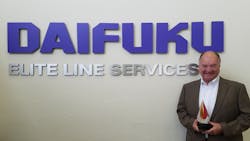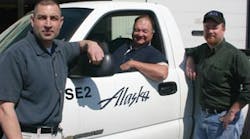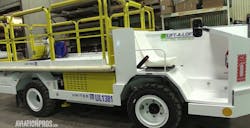Dewey Kulzer knew he wanted to work in aviation. But it would have been hard to fathom just how many places working with ground support equipment would take him.
He has crisscrossed the United States, working in the South, the Midwest, the Pacific Coast, the East and even Alaska. He has worked internationally, assisting with GSE projects in the United Kingdom, South America and the Caribbean.
During his travels, Kulzer has gathered an abundance of experience and wisdom that he has tried to pass on to his team.
“Over my career, I have been fortunate to be able to manage the GSE departments for three airlines, building two of them from the ground up,” Kulzer says. “Most of all, I have had the opportunity to help build people, help further their skills and opportunities to achieve more than I ever have. To me, the measure of a person’s success is not how much they are going to miss you, but how much you did to make the people that follow you so much more.”
Considering all the stations where he has worked, the number of GSE units he has developed, maintained and deployed, and the vast amount of people he has influenced, Kulzer’s impact on the ground support industry will be felt for many years after his retirement later this fall.
That is why he has been selected by Ground Support Worldwide to receive the 2019 Lifetime Achievement award.
Professional Rise
“As a kid, airplanes fascinated me,” Kulzer says. “I had to work around them.”
Although color-blindness prevented him from being an air traffic controller, Kulzer quickly became involved in aviation administration. After graduating from college, Kulzer began his aviation career as a counter agent for Mississippi Valley Airlines at Minneapolis-St. Paul Airport (MSP) in 1976.
He moved to Air Wisconsin, working first as a station manager and then in 1981 was promoted to manager of GSE.
“While at a manager meeting for Air Wisconsin, the president of the company came into the meeting and asked if anybody knew anything about equipment. I had worked my way through high school as an auto mechanic,” Kulzer recalls. “I said I did and was immediately sent to Cleveland to fix their problems with a deicer. Then I was sent to the next problem station and the next. I never returned to the MSP station and was suddenly the manager of GSE.”
The new position required a relocation to Fort Wayne, Ind., where he built a GSE department from a group consisting of just himself to a core team of nine over the next four years. He connected with people he knew at Eastern Airlines and eventually met with their manager of GSE in MIA, Jack Wyle. Wyle gave Kulzer two weeks of his time, showing how a GSE department should be structured.
“Over the next two years, I must have spent six weeks with him and his department, learning the ropes,” Kulzer says.
Kulzer joined Aircal in 1985 as GSE supervisor at Mineta International Airport (SJC) in San Jose, Calif. He was in charge of Aircal’s GSE at SJC and all stations to the north.
“I opened [Anchorage International Airport] ANC for them in 1987 – little realizing how large a part of my life Alaska would later be,” Kulzer says.
When American Airlines acquired Aircal in 1988, Kulzer was relocated to the airline’s headquarters at Dallas/Fort Worth Airport (DFW) to serve as a GSE analyst. He later became a GSE engineer before being promoted to manager of GSE for American’s worldwide operation in 1990.
In 2000, Kulzer opened a specialty department for American Airlines called “GSE Technical Support” to develop electric and other alternative fuel GSE aimed at supporting environmentally sensitive locations like California.
“Shorty after Sept. 11, 2001, my complete small group was part of the 20,000 employees laid off by AA,” Kulzer says, reflecting on a difficult time for the aviation industry.
He spent the next year performing consulting work for the Environmental Protection Association (EPA) and Federal Aviation Administration (FAA) before joining Elite Line Services (ELS) in October 2002.
“I’ve had a wife who’s foolish enough to follow me,” Kulzer says with a smile. “And it’s been an endless adventure. And I’ve been very fortunate because the adventures have been so unique.”
ELS
Kulzer began his tenure at Daifuku Elite Line Services as the site manager for Seattle-Tacoma International Airport (SEA), overseeing the airport’s terminal expansion program, known as STEP. A year later, he was promoted to East regional manager.
In August of 2004, ELS accepted a contract with Alaska Airlines to build a GSE department, as well as maintain and manage the airline’s GSE maintenance across all its stations.
“I was promoted to project director and agreed to relocate to ANC to build the program for 21 locations in Alaska, SEA, PDX, all of their lower 48 sites and Mexico,” Kulzer recalls.
For the first four years of the five-year contract, Kulzer acted as Alaska’s GSE manager, reporting to an Alaska Airlines’ director.
“In 2006, GSE maintenance support for USAir at [Ronald Regan Washington National Airport] DCA was added to my division, followed by maintenance support for baggage/jetbridge at the international terminal at [San Francisco International Airport] SFO, and GSE maintenance support for [Northwest Airlines] NWA in SEA in 2008. I was then promoted to regional director.
“In 2010, at the end of the five years, I relocated back to Texas, managing the operations from there.”
In 2014, Kulzer began GSE support for Dayton International Airport (DAY). What’s more, Detroit Metropolitan Airport (DTW) for Delta Airlines was added along with Raleigh-Durham International Airport (RDU) for American Airlines.
Finally, in 2016, he moved into the role of senior operations director for GSE at Elite Line Services.
“This is where I will be finishing out my career,” Kulzer says.
Projects and Milestones
While relocating his family frequently came with challenges, Kulzer found himself working on intriguing projects.
While with American Airlines, Kulzer opened a station at London Heathrow Airport (LHR) and also converted the Eastern Airlines stations in the Caribbean and South America to American Airlines.
“When AA purchased the London routes from TWA, I was the only GSE person sent to LHR to make it happen,” Kulzer recalls. “I had to learn to think like the British mechanics. I had to get them to believe in me.”
He was able to overcome cultural challenges and got his British counterparts to buy-in to the plan. And he convinced their families to go along with it too.
“It was just learning. It was the first time I had been in an international situation, learning how to win an international team,” Kulzer says.
The GSE expert was a part of large-scale projects domestically as well.
Kulzer was instrumental in developing an eGSE program for American Airlines that won the American Lung Association’s Breath of Life Award. It was also recognized by the Department of Energy for alternative fuel development.
Kulzer is most proud of the work he has done on behalf of ELS for Alaska Airlines.
“How often do you get the opportunity to take your experience and build a complete GSE program for a major carrier? I had that with Alaska Airlines,” Kulzer says. “The partnership we built with Alaska is now in its 15th year and has never been challenged. It was built with transparency and trust on both sides and is the same today.”
He appreciates the airline treating ELS as a full partner, adding a 15-year partnership that has never been bid tells the story of this successful partnership.
Influential and Supportive People
When Kulzer joined the aviation industry, stalwarts like Bob Six, Frank Borman and Bob Crandall were “building empires.”
“I was fortunate to sit in on a few Frank Borman staff meetings,” Kuzler points out. “Bob Crandall drove American from a dying carrier to the largest in the world. It was a time of growing, conquering and making the impossible happen. It was beyond exciting.”
Kulzer thrived on the excitement and sought to learn as much as he could about ground support and the aviation industry, as a whole.
“At American Airlines, I was very fortunate to have two outstanding mentors that believed in me and truly taught me,” Kulzer says. “Dennis McKaige and Bob Baker took the time and invested in me. I have been trying to pay that back by investing in others ever since.”
McKaige and Baker weren’t the only ones supporting Kulzer. He is quick to point out his that wife Lois has always stood beside him, and his children DJ, Sara and Stephanie were open to moving around the country.
“We’ve been rolling stones,” Kulzer says. “It started with having a fantastic woman at my side that has supported and followed me as I dragged our family from one side of the country to the other. Without that, none of the rest would have been possible.”
Kulzer emphasizes Lois’ support was critical to his professional success, providing support at home and standing alongside him when decisions to relocate were made.
“I’ve been lucky to have a son that drank the Kool-Aid, listened to the stories and wanted to follow me into GSE and make a difference,” Kulzer adds.
DJ Kulzer, who now serves as manager of GSE programs at ELS, says his family moved approximately 15 times before he was in the third grade. But seeing his father’s work up close prompted him to get involved in the industry.
“I grew up learning the equipment by running around and playing on it,” he points out. “Then watching him build the different divisions and watching the airlines and the way they’ve grown has been fun.”
Personal Management, Not Personnel Management
Kulzer believes that with the rise of “management” in the industry, leadership fell by the way side.
“The belief became that a good manager could manage anything; it was all about the numbers,” he says. “We lost the concept of leadership. People don’t want managers, they want leaders. They want someone that they can believe in and follow.
“Your people are the ones that make it happen. When you forget about managing your people and start leading them - realizing that they are what will make the success happen - then anything is possible.”
Kulzer says if someone provides sincere leadership, honesty and integrity, then management becomes easy.
“It has taken me a large part of my career to move on from being a good manager to, I hope, a good leader,” Kulzer says. “My people deserved good leadership, and I hope I have provided that.”
“I have learned that I must manage myself before I would ever effectively lead and manage others,” Kulzer says.
Effectively leading others begins with efficient operations. To guarantee that, Kulzer says to be mindful of the parameters of the project.
“The key is realizing that your budget needs to be your business plan and something that you utilize every month – not just once a year,” Kulzer says. “Combined with a focused staff, the rest is easy.”
He explains the staff needs to be part of the plan, the action and the results because people want to believe they have a purpose and know they make a difference.
“Our only asset is people,” Kulzer says. “If it was a machine, you would maintain it. People are no different.”
Throughout his career, Kulzer has strived to keep his team happy and working at capacity. Between Christmas parties, fun awards, contests, appreciation dinners and fishing trips, he has sought ways to make his employees feel valued.
“He likes to share his knowledge and experience. He doesn’t withhold that,” ELS executive vice president Gary Zarycki says.
“He’s the best team-builder I’ve ever met,” he continues. “He takes an active interest in the folks who work for him. He’s interested in, not only their professional development, but also their personal development.”
Zarycki points out that the time and attention Kulzer gives to his people and projects has led to a lot of success.
“When he goes to visit a site, he’s there for the whole week. He’s investing his time to build a team, and that team supports him 100 percent,” he says. “They’re probably the most loyal bunch you’d ever meet because he’s done right by them along the way.”
Career Reflections
“I have been extremely blessed through my career. It’s been filled with excitement, adventure and, at times, some terror,” Kulzer says.
He recalls the early portion of his career when he was still getting established. He attended a meeting of the SAE GSE group in Orlando, listening to the “old-timers of the industry” share stories about drawing outlines in chalk on the manufacturer’s shop floor to show what was required of container loaders for the first wide-body aircraft.
“I asked my wife just after that meeting if she thought I would ever be one of them,” Kuzler remembers. “Twenty-five years later, at another meeting, again in MCO, she reminded me of the question I had once posed to her and pointed out that I now was drawing out new machines on the white board at the manufacturers.’”
“He understands the industry probably better than anyone I’ve ever met,” Zarycki says, adding Kulzer really understands total cost of ownership (TCO). “It’s more about ‘Hey, you understand the industry. What do we need to do to improve?’”
There have been challenges along the way, however.
GSE can be considered a necessary evil, Kulzer notes. So, getting the resources to do his job could lead to a lot of follow-up questions. He says finance departments would argue for repairs or less expensive solutions.
Getting recognition for his people was often a challenge too.
“Often, the people directly involved with the aircraft were recognized, but they forget the people back at the shop that gave them the tools to do it,” Kulzer says. “They forget that there had to be someone out there at 3 a.m. to get the ice off, get the equipment running and get the deicers ready. I believe that was probably the largest frustration and challenge.”
But Kulzer didn’t let challenges defeat him.
“You overcome it by not giving up. Not just accepting it,” he says. “I have a very hard time giving up.”
Challenges remain today – most notably attracting the next generation of workers to maintenance.
“Over the last few years, finding good people is getting harder and harder. We are competing with the auto dealers, auto shops, fleet owners, etc., for a continually scarce resource,” he says.
The world changes and aviation is no exception.
When he started, Kulzer says airlines had large GSE design engineering departments. Now they have a few just to check the manufacturers.
Also, maintenance has gone from “running it from the seat of your pants,” to utilizing data tracking, productivity and utilizing outside organizations to perform the maintenance more effectively and efficiently.
“This is a balance between insourcing and outsourcing,” Kulzer notes. “Both can be efficient.”
Kulzer is very proud of the work ELS has done in terms of outsourced GSE maintenance.
“I once knew a guy that built a company manufacturing hardware. He wanted to build the best nuts and bolts in the industry. He did not want to build buildings or fly airplanes. His world was building the best hardware,” Kulzer says. “That’s what we, at ELS, are. We are focused on providing the best GSE maintenance support in the industry.”
He has attempted to pass that pride in his work on to others and is excited for people like his successor Tyler Elgin to take what he’s established and build on it further.
A Lasting Impression
“I don’t know anybody in our industry that’s had a greater impact than Dewey,” Zarycki says earnestly. “It’s been an honor and a privilege to work side-by-side with him.”
Plenty has changed from the days when Kulzer began working on Beach 99s and DC3s with leftover tugs from World War II to today’s world of high-tech and electric GSE.
But throughout his career, working with planes never lost its excitement.
Kulzer says working on vehicles and other GSE allowed him to lead a great group of people “while still being able to play with airplanes.”
“When a kid looks up at the sky to watch an airplane fly overhead, he never imagines the many pieces of equipment and people that made that flight possible,” Kulzer states. “The airport does not move without ground equipment. The airplane won’t get into the air without us. Yet, it is one of the least recognized groups.
“Knowing all the men and women who make each and every flight possible is now what I see when I watch my grandkids looking in awe at that plane overhead.”






